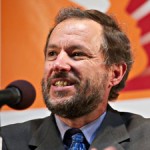Archive for August, 2013
The greatest speech on earth
By Jonathan Power
Fifty years ago Martin Luther King made his earth-shattering “I Have a Dream” speech on the steps of the Lincoln Memorial in Washington DC.
Is there anybody who watches and listens to it on YouTube not moved to the soles of their shoes? I’ve heard it a hundred times and still it stirs me. His dream that one day his children would “not be judged by the colour of their skin but by the content of their character” is one of the greatest lines in all oratory. The south of the US, he said, was “sweltering with the heat of injustice, sweltering with the heat of oppression”.
Within ten years of the end of America’s civil war, fought over the issue of slavery, southern white Democrats had established state constitutions that stripped black citizens of their newly won political rights. Terrorist groups like the Klu Klux Klan destroyed black schools and churches and murdered at will. At the time of Dr King’s speech they were still doing it. Three weeks after his speech Klansman bombed a Baptist Church in Birmingham, Alabama, killing four little girls.
At the time of the March on Washington I was working in Africa. But at the next great event in the civil rights movement in 1965 I was there – in Selma, where Dr King led marchers from the segregated town – where a black couldn’t even sit in the same cafe as a white man to drink a cup of coffee – to the state capital of Montgomery. Read the rest of this entry »
Good peace proposals quite often works!
By Johan Galtung
Kuala Lumpur: Perdana Global Peace Foundation, 25 August 2013: “Global Peace Efforts: What Went Wrong & What Next?”
The TRANSCEND NGO Mediation Network just turned 20, and our experience is clear: a good peace proposal quite often works.
To mention some out of 30 positive experiences: we have had a hand in launching peace studies and peace journalism; improving race relations in Charlottesville, VA; in ending the Cold War through bridge-building between Norway and Poland, the idea of a Conference for Security and Cooperation in Europe and nonviolence; in improving North-South relations through South-South cooperation and then relinking with North on a basis of equity–this from the early 1960s.
Later on there have been contributions to peace on the Korean peninsula (first unify the nation, then perhaps the countries), the Kurdish issue (a Kurdistan as a confederation of human rights-based autonomies in the four countries), ending the longest war in Latin America, Ecuador/Peru (a two-state condominium up in the Andes with a natural park, later a joint economic zone); in tripartite peace in the Caucasus; in solutions for bullying in schools; in judicial mediation; in the problem of settlers in Zimbabwe; conciliation Germany/Herero, Turkey/Armenians, Denmark/Islam; and so on and so forth, up till now.
Our conspicuous failures include Read the rest of this entry »
The spreading wings of Islamophobia in Egypt
By Richard Falk
The Orwellian features of the military takeover in Egypt have received attention, although the use of language to evade unwanted truth continues because incentives to do so persist. For this reason, Washington has remained unwilling to call what happened in Egypt on July 3rd as a coup, despite its unmistakable character. The nature of Egypt’s coup has daily become more and more evident.
It is now clear that not only was the takeover properly described as coup, but it has turned out to be a particularly bloody coup that is now being reinforced by a total lockdown of opposition forces and democratic options, including even dissenting opinions. Read the rest of this entry »
Egypt: Polarization and genocide
By Richard Falk
In these morbid days, there are some home truths that are worth reflecting upon.
What Happened to Tahrir Square?
In retrospect, ‘’the January 25th Revolution’ in Egypt is ‘a revolution’ that never was, which has now been superseded by ‘a counter-revolution’ that was never possible. Why? The dislodging of a Mubarak dynasty in 2011 did not even achieve ‘regime change’ much less initiate a transformative political process. There was no revolution to counter. Even more modest hopes for political reform and humane governance were doomed from the start, or at the latest, when Ahmet Shafik, the overtly fulool candidate of the discredited Mubarak regime polled almost 50% of the vote in the presidential election runoff against Mohamed Morsi in June 2012.
What then was Tahrir Square?
Part project (getting rid of Mubarak and sons), part fantasy (hoping that the carnivalistic unity of the moment would evolve into a process of democratic state-building), part delusional experiment (believing that the established order of Mubarak elites and their secular opponents would be willing to rebuild a more legitimate political and economic order even if it meant that they would be transferring significant power and status to the Muslim Brotherhood).
The 2011 turn to ‘democracy’ in Egypt always contained a partially hidden condition: the Muslim Brotherhood was welcome to participate in an electoral process so long as its support was not so great as to give it a majoritarian mandate. Read the rest of this entry »
On Bradley Manning and America
By Richard Falk
I am posting on this blog below two important texts that deserve the widest
public attention and deep reflection in the United States and elsewhere.
I would stress the following:
• the extraordinary disconnect between the impunity of Bush, Cheney,
Rumsfeld, Yoo, and others who authorized and vindicated the practice
of torture, were complicit in crimes against humanity, and supported
aggressive wars against foreign countries and the vindictive rendering
of ‘justice’ via criminal prosecution, harsh treatment, and overseas
hunts for Snowden and Assange, all individuals who acted selflessly out of concern
for justice and the rights of citizens in democratic society to be informed
about governmental behavior depicting incriminating information kept secret to hide
responsibility for the commission of crimes of state and awkward diplomacy.
A perverse justice dimension of the Manning case is well expressed in
the statement below of the Center of Constitutional Rights “It is a travesty
of justice that Manning who helped bring to light the criminality of U.S.
forces in Iraq and Afghanistan, is being punished while the alleged perpetrators
are not even investigated.” And “We fear for the future of our country in
the wake of this case.”
• the vindictive punishment of Bradley Manning, Read the rest of this entry »
Globalizing homeland security – the U.S. drift toward autocracy
By Richard Falk
The drift toward autocracy: It is not just one thing that should worry us about the authoritarian tendencies of the Obama presidency, but one thing after another. The cumulative effect of it all.
The latest sign of the times was the August 19th detention of David Miranda, Glenn Greenwald’s partner, at Heathrow Airport under the British anti-terrorist law for nine hours. His laptop, cell phone, and other electronic devices were also confiscated, and presumably examined. We need to wonder what is so frightening about ‘the Snowden documents’ that it induces these flagrant intrusions on the privacy and confidentiality of journalists, and now even their associates who are not known to be accomplices.
President Obama keeps reassuring Americans, and indeed the world, that he shares a concern for protecting elemental rights, and yet he seems to spare no means to move against disclosures of information that seems awkward for the United States and some allies even when not of particular interest to Al Qaeda and the like. Read the rest of this entry »
Washington and the Egyptian tragedy
The vast majority of Egyptians killed since the coup have been unarmed protesters struck down with American-made weapons by soldiers transported in American-made vehicles provided by the American taxpayer.
As in El Salvador, Nicaragua, East Timor, Angola, Lebanon, and Gaza in previous years, the massive killing of civilians in Egypt is being done with U.S.-provided weapons by a U.S.-backed government. As a result, the Obama administration and Congress are morally culpable for the unfolding tragedy. While the apparent decision to suspend some military aid to Egypt is certainly welcome, the role the United States has been playing has, on balance, made matters worse.
As with many of these other cases, elements of the Egyptian opposition have contributed to the bloodshed and bear some responsibility. Continue reading at Foreign Policy In Focus
Democracy must quickly be returned to Egypt
By Jonathan Power
The military’s crackdown in Egypt was foolish. Democracy is not. Without democracy there is no way of arbitrating the clash of interests, the demands and beliefs in this gravely disturbed society.
The military/civilian government, instead of resolving to break the back of the Muslim Brotherhood and thus, counter-productively, drive it underground, should speed ahead with a fast re-write of those clauses of the constitution that offend liberals and secularists – on the role of women and the place of shari’a law – and then immediately call an election open to all.
All this could and should be done within three months at the most. It is highly unlikely that the Brotherhood would win this time but if they did they should be allowed their victory – as long as they promise the present interim government not to use their position to re-create the kind of rule that was the undoing of the deposed president, Muhammad Morsi. Read the rest of this entry »
Why Western media frames civilian areas as “Hezbollah strongholds”
By Sharmine Narwani
Beirut was thrown into turmoil on Thursday evening as a terrorist attack against residents of Dahiyeh – a southern suburb of the Lebanese capital and a predominantly Shia neighborhood – threatened to draw the country into a region wide crisis.
As conflicting news reports began to eke out in the immediate aftermath of the city’s deadliest car bombing in eight years, there was a disconcerting congruity in headlines beaming out from western capitals – and it had nothing to do with facts.
In lock-step, western media was calling the scene of the crime a “Hezbollah stronghold” – Continue reading here.
Restless nation: the real meaning of Iran’s elections
By Stephen Zunes
Will the people of Iran get the reforms they asked for in electing the moderate Hassan Rouhani? The answer depends partly on them, and partly on the United States.
Earlier this month, Iran inaugurated its new president, Hassan Rouhani—clearly the most moderate candidate in the running.
This outcome illustrates the growing desire for change among the people of Iran. The situation resembles Eastern Europe in the 1970s: The people are not yet at a point where they can bring down the regime, but the ideological hegemony that kept the system intact is gone. Continue reading here…




